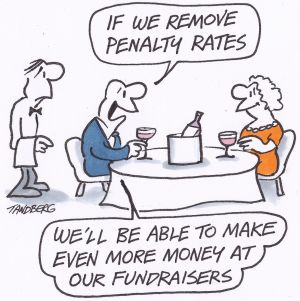Cuts to penalty rates would increase shareholder profits or result in negligible savings for customers who shop at major retailers including Myer and JB Hi-Fi, new analysis shows.
But despite business groups insisting that penalty rates should be cut to prevent job losses, the new financial analysis by Citigroup is silent on any positive impact on employment.
More National Times Videos
The boss who likes penalty rates
Sydney hotel owner Harry Hunt says it would be 'devastating' for Australia to change penalty rates.
Former ACTU assistant secretary Tim Lyons from think tank Per Capita said the Citigroup report confirms cutting penalty rates will not save or create more jobs.
"What this reveals is the campaign to cut penalty rates is about taking money out of workers' pockets into shareholders' pockets," he said.

"The idea that there will be a reduction in penalty rates and the response from employers will be to put more people on flies in the face of the financial evidence."
Mr Lyons said the new research was conducted by people who have "no skin in the industrial relations game".
"It is purely about what the financial effect is," he said.
"It doesn't occur to them there will be any employment effect. The overwhelming effect is the shareholder effect."

The Citi Research analysis shows cutting penalty rates would boost shareholder earnings by 8 per cent for Myer and JB Hi-Fi and 5 per cent for Wesfarmers.
"While one extreme is retailers retain all the benefits for their shareholders, the other extreme is that retailers pass on all the benefits as lower prices or better service," the report says.

"The reality will be somewhere between these two extremes.
"If the saving is passed on to consumers through lower prices, the impact will be negligible at less than 1 per cent."
The Citigroup analysis also shows that as at November this year, most of Australia's ASX-listed retailers have expired enterprise agreements. Those with expired agreements included Big W, Bunnings, Coles Supermarkets, JB Hi-Fi, Just Group, Kmart, Myer and Target.
"The reason most retailers have expired EBAs in our view is the hope that wage reform will be implemented lowering penalty rates," the Citigroup report says.
The Fair Work Commission is reviewing penalty and weekend pay rates in response to calls from retailers they be cut.
The Citigroup report says retailers regularly use younger staff and permanent part-time staff instead of casual labour to keep costs down.
After the federal election earlier this year, National Retail Association's chief executive Dominique Lamb was quick to ramp up the importance of cutting penalty rates to create more jobs
The Australian Productivity Commission has concluded Sunday penalty rates frustrate the job aspirations of the unemployed and people who are only available for work on Sunday.
In its review of the national workplace relations system, the Productivity Commission reported late last year that penalty rates have a role to play in compensating employees for working long or "asocial" hours. But it said Sunday rates should be aligned with Saturdays to create a uniform weekend rate for restaurants, cafes, hospitality, entertainment and retail industries. Sunday penalty rates were inconsistent across similar work and "anachronistic in the context of changing consumer preferences".
The Australian Industry Group and Australian Chamber of Commerce and Industry agree with that assessment and hope the Fair Work Commission will come to the same conclusion.
The ACCI says young people are attracted to industries operating outside of the 9am-5pm Monday-Friday cycle and often prefer to work "unsociable hours".
The AIG also says the fast-food industry is made up of young people who are studying.
















0 comments
New User? Sign up